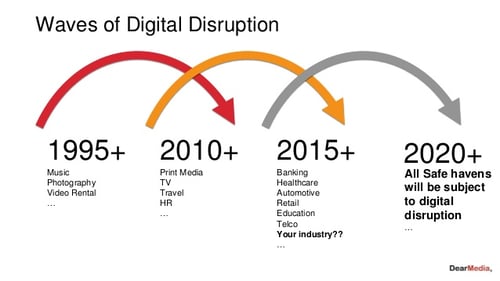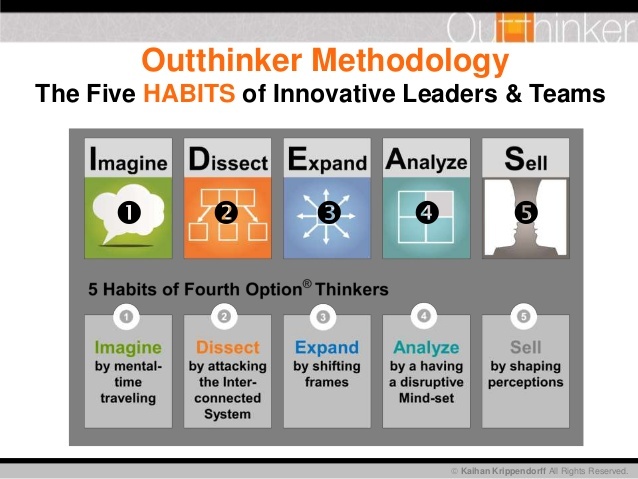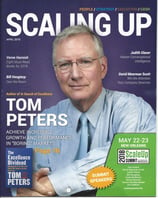“In preparing for battle I have always found that plans are useless, but planning is indispensable.” Dwight D. Eisenhower
You may have heard this quote from General Eisenhower from World War II.
If you’re confused by it, like I, and Simon Sinek was, watch the video.
PLANS ARE USELESS
Many pundits and experts consider planning today to be a waste of time. The world’s economy changes so fast, no plan is relevant the minute it is written down. Already a new technology, development, competitive move, irrevocably alters or makes your plan obsolete.
It’s true.
The Pace of Change is so accelerated, your business and people need to be agile, informed, and alert to respond to emerging trends.
If things change so quickly today, why do we need to plan at all? Since the Gulf War in August of 1990, technology changes have disrupted every business. This graphic from the Outthinker Process shares the waves of digital disruption and carnage it’s left in its tracks.
What’s the sense in planning when your plans are useless?
PLANNING: AN EVENT OR A PROCESS?
Listen to Simon Sinek on the video.
The Military plans, and plans, and plans more. Virtually every plan made never gets implanted.
Just as Sinek points out, when the subprime mortgage crisis hit, no one had a back up plan. The result – CHAOS!
When you do planning as an event, the results are short term. When planning is a process, it’s not only a tool to help you forecast the future, it helps you navigate through changing times.
Planning for a battle is probably the ultimate unpredictable scenario. In Football, Bill Belichick of the New England Patriots sees planning as invaluable!
The reality is no plan is flawless.
“Businesses that plan always do better than businesses that don’t. But business that change their plans are always more successful than businesses that plan but don’t change them.” ~Michael Gerber, E-Myth Seminar
 You create a plan to describe how you would like things to proceed. You plan for contingencies, and then you implement the plan as closely as possible. Inevitably, things will not go as you hoped, and you will have to change your plan. If you plan carefully, you know where you are in the process and what resources you have available.
You create a plan to describe how you would like things to proceed. You plan for contingencies, and then you implement the plan as closely as possible. Inevitably, things will not go as you hoped, and you will have to change your plan. If you plan carefully, you know where you are in the process and what resources you have available.
It’s easier to adapt to the new scenario.
If things turn out differently than you hoped, you are in a good position to:
- Adjust your plan to reach your desired outcome with the new circumstances included in your process, or
- Decide to change direction and head toward a different goal.
In the second option, having stayed with a plan means you understand your current situation and how you got there. You also know what tools you have ready to apply toward the new objective. Having had a plan puts you in a much better position to plan effectively to reach your new destination.
Crafting a 3 or 5 year plan moves your team into a mental mode of transformation.
EXECUTING
When you understand planning is a process rather than an event, you invest time in the process. Your leadership team learns to plan better. See obstacles, trends before they threaten your business. The more you forecast, the better you get at it. You don’t become overly consumed with the outcome.
The process of planning, contributes to your team’s growth and development. It helps them to adjust and be flexible when business or the market changes. Several of my businesses have made major adjustments to their Annual and Quarterly plans.
I shared one of my customers decision to change their top priority in When to Change Your Top Priorities shortly after I went into the hospital in 2012 with Acute Myeloid Leukemia. The years of planning with my customers helped me to adjust my annual and quarterly plans from my business, which included working from my hospital room for 7 months.
3-5 YEAR PLANNING.
 Kaihan Krippendorff’s OUTTHINKER PROCESS is Positioning Systems tool to help our customers imagine an envisioned future with new strategy and tactics for an evolving world economy.
Kaihan Krippendorff’s OUTTHINKER PROCESS is Positioning Systems tool to help our customers imagine an envisioned future with new strategy and tactics for an evolving world economy.
The 5 steps to achieve a 3-5 year plan include:
- Identify the “mess,” the undesirable but realistic result of you continuing on your current path.
- List the key trends that will shape the long-term future.
- Envision the long-term ideal outcome you want.
- What must be true in the near-term for you to be confident you are on the path?
- Considering the situation, ask a strategic question.
 The result of this work is a 3-5 year plan, strategies and tactics to achieve it, and benchmarks halfway to this objective to reveal whether we are on the path to achieving our 3-5 year plan.
The result of this work is a 3-5 year plan, strategies and tactics to achieve it, and benchmarks halfway to this objective to reveal whether we are on the path to achieving our 3-5 year plan.
Adjustment, changes, planning will be required, all of which will take place as we continue to do, quarter and annual planning.
Growth demands Strategic Discipline.
The 3 Strategic Disciplines: Priority, Metrics and Meeting Rhythms help your business dramatically improve your forecasting, and alignment, empowering your team to achieve accelerated growth. These Execution principles pave the road to success on your 3-5 year plan.
Positioning Systems helps your business grow through the Four Decisions: People, Strategy, Execution, Cash.
Positioning Systems helps mid-sized ($5M - $250M) business Scale-UP. We align your business to focus on Your One Thing! To achieve growth, you need to evolve in today’s rapidly changing economic environment. Are you avoiding a conversation with yourself on how to can successfully grow your business? Contact dwick@positioningsystems.com to Scale Up your business! Take our Four Decisions Needs Assessment to discover how your business measures against other Scaled Up companies. We’ll contact you.
 NEXT BLOG - THE ONE THING Helps Entrepreneur Sell His Business for a Premium
NEXT BLOG - THE ONE THING Helps Entrepreneur Sell His Business for a Premium
Verne Harnish and Gazelles introduced a new magazine SCALING UP. Visit the magazine at the link provided. I’m honored to have an article published in the magazine’s Coaches Corner section(page 20), about an entrepreneur, Phil Liber, P&L Technology, my coaching helped his business sell for a premium in just six months of coaching. His story, next blog.






.jpeg?width=150&height=135&name=Hand%20with%20marker%20writing%20the%20question%20Whats%20Next_%20(1).jpeg)

